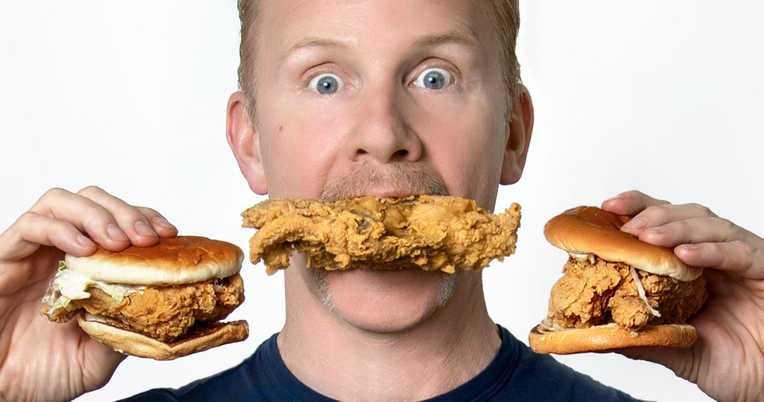Jim Schembri’s streaming reviews. 23 Apr, 2020

SUPERSIZE ME 2: HOLY CHICKEN! *** (103 minutes) M
As a sequel to his 2004 megahit doco about the ills of the American fast food industry, funnyman/troublemaker/masterful self-promoter Morgan Spurlock hits dead centre with his wittily conceived update about the clever marketing behind junk food.
Made in 2017 and released theatrically and online late last year, Holy Chicken is actually more satisfying that Supersize Me, standing as a better, more effective example of agenda-driven activist film-making.
Revisiting Supersize Me now almost makes you cringe at how obviously biased Spurlock was at the outset. Demonstrating the health risks of junk food by only eating junk food was bound to produce the results he wanted. As we often see with Michael Moore’s work, it was certainly entertaining yet only provided a cinematic version of confirmation bias.
In Holy Chicken Spurlock, though full of his signature smarm and bluster, takes a more balanced and measured approach in his crusade to illuminate the spin behind the cleverly honed health-speak that surrounds fast food today.
The best way to accomplish this, he decides, is to jump in head-first, gonzo-style, and actually start up his own fast food restaurant from scratch.
With chicken being the hottest item on the “healthy” fast food menu he adopts a farm-to-table concept – raising chickens himself, growing them till they’re nice and plump, then turning them into chicken sandwiches and serving them up in his restaurant in Columbus, Ohio (the test marketing capital of the world, apparently.)
His creed is 100% honestly, so Spurlock covers his carefully coloured walls, place-mats and drinking cups with fast facts about how smart product labelling has created the powerful impression that fast food is much healthier than it once was.
His research journey is often alarming. He finds out how easily a farm can be officially recognized as “free range”, how so much of food branding is good old doublespeak and that raising chickens quickly to enormous sizes results in some dying of heart attacks and trying to walk with legs that can’t take the weight.
Politically, Spurlock gets into the workings of the “big chicken” companies that supply chicks to most farmers and how they can ruin non-compliant farmers by providing sub-standard birds.
Spurlock seems aware that his antics won’t change much. His purpose here is simply to inform people, knowing full well the irony at the heart of his enterprise. Still, it’s terrific viewing, often funny, sometimes scary.
The film has become something of a redemptive project for Spurlock.
A recovering alcoholic and manic depressive, his pre-emptive public confession in December 2017 outlined his sexual misdemeanours and misconduct, coming shortly after the #metoo movement bloomed on the back of the Harvey Weinstein case. He saw what was going on and wanted to fess up before being found out.
Consequently he and the film, which had been enjoying success on the international festival circuit, suffered.
Spurlock lost a lucrative $US3.5 million distribution deal with YouTube Red and lost his production company, putting many people out of work and delaying the release of Holy Chicken until late last year.
In his recent press campaign, Spurlock duly applied his creed of honesty to himself, being upfront about his sexual misconduct and history (including an allegation of rape from his college years), his alcoholism and his hope that Holy Chicken would signal the emergence of a better version of himself.
(Amazon Prime)
DON’T F### WITH CATS: HUNTING AN INTERNET KILLER **** (three episodes; 186 minutes) MA
Those who have had their appetite for long-form true crime documentaries roused by the weird and wild exploits exposed in Tiger King should set aside an afternoon to catch Don’t F*** With Cats, an arguably more intriguing – and unarguably much darker – foray into the dynamics of murder.
Extremely well-directed by Mark Lewis, who follows the story chronologically in exacting detail, we are taken on a bell dive into the evil netherworld of the internet by two intrepid Internet hounds, Deanna Thompson and John Green.
A viral video of a young man suffocating two kittens disgusts them along with thousands of others, all of whom voice their outrage on forums using a lot of flaming, cussing and multiple exclamation points.
As the tide of vitriol subsides the two, who don’t know each other, begin wondering “what happens next?” For as the internet teaches us each day, expressing anger is one thing, actually doing something is another.
Determined to bring the perpetrator to justice they join forces and begin an online investigation, kicking off their pursuit by going over the video in forensic detail, looking for clues as to the person’s identity and location. Their followers volunteer information and research, turning the task into a truly communal, crowd-sourced endeavour.
The road to the truth is long and winding, pitted with clues and occasional burst of satisfaction as they inch closer to their quarry, a deviant who is aware of being chased and uses the presumed anonymity afforded by the internet to goad them.
But the killing of the cats turns out to be only part of the criminal picture as the diseased mind of their suspect becomes more and more pronounced. The final stretch of the chase is truly disturbing, falling squarely into the once-seen, never-forgotten category.
Released in December last year, the slow burn series has not received the attention it clearly deserves for its compelling narrative, visual panache and attention to detail, much of it in the form of Google searches and CC video.
It is certainly strongly recommended for anyone fixated by the life of Joe Exotic looking for a deeper, darker experience. Just beware; there’s a lot of unnerving, adults-only content that requires some fortitude to get through.
(Netflix)
CRISIS IN SIX SCENES **1/2 (six episodes; 141 minutes) 18+
Though far from his best work, Woody Allen’s six-part mini-series is thankfully not the mega-turkey his detractors have made out.
Made in 2016 and set mostly in a comfy country house in upstate New York during the upheavals of the 1960s, Crisis in Six Scenes sees fading writer Sidney Munsinger (Allen) and psychiatrist wife Kay (comedy legend Elaine May, now 87) reluctantly provide sanctuary for Lennie Dale (Miley Cyrus), a political activist on the run.
Also staying with them is Allen (John Magaro), the son of friends who is to marry the beautiful Ellie (Rachel Brosnahan from The Marvelous Mrs. Maisel).
Naturally, Lennie’s radical, anti-capitalist values clash with Sidney’s love of peace and conservatism. They hate each other instantly, she decrying his conformity and adherence to the system, he complaining about her communist philosophies and tendency to eat all of his favourite foods.
She also has a charismatic effect on the bookish Allen, whose highly structured view of the world and of his future begin melting as he becomes entranced and excited by Lennie’s radicalism and rakish beauty.
Though presented as a TV series, Crisis is more accurately described as a so-so Woody Allen movie chopped into six parts. And for the first three at least, it’s a bit of a dog’s breakfast.
For the first time since 2012’s To Rome With Love Allen cast himself in the film, which was probably a mistake. At 84 he can still deliver the occasional throwaway line, but as a character he is a bumbling collection of curmudgeonly jitters and paranoia about the house being bugged by the FBI.
Contrary to his trademark concision, Allen’s direction is often lax; many scenes go on way too long and there is some surprisingly clumsy cutting. One imagines that if he had the chance to re-edit the series into a single film he’d trim its 140 minutes down to a lean 100 or so. There are a lot of sluggish moments and comic digressions that aren’t up to par.
However, things do improve from the half-way point once some plot lines begin to congeal and the pace quickens.
May is wonderful as his more successful wife, but the real revelation here is the spirited performance by pop princess Miley Cyrus, who seems to revel in the role, especially when exchanging barbs with Allen.
Fans of Allen’s work are the most likely to find value here, particularly in the comic set-ups that occur in the last two episodes. So, no, it’s not the unwatchable dross so many write-ups have made out.
Despite the promise it held to reinvigorate Woody Allen’s career, the making of Crisis in Six Scenes turned out to be disaster for him.
Thinking a TV show would be a piece of cake and a fast way to earn big money he struggled with it and was not happy with the result, something he has said openly since.
The show was also supposed to be a coup for streaming giant Amazon Studios, which had a four-film deal with Allen.
However, the #metoo movement raised historic claims by his adopted daughter Dylan Farrow that Allen had assaulted her as a child. (Those charges, always denied by Allen, were never proved.) Allen commented that he supported #metoo, claiming he would make a good poster boy for them.
Amazon took umbridge at this, claiming Allen had breached their contract, thus stranding Allen’s new film A Rainy Day in New York, which was not distributed in the US, only getting overseas exposure through other companies.
In February last year Allen began to sue Amazon for $86 million, but the matter was settled for an undisclosed sum in November.
The experience, which was meant to be a glowing twilight chapter in Allen’s career, has clearly burnt him. Woody Allen’s next movie, Rifkin’s Festival, is an Italian/Spanish/American co-production.
Not surprisingly, there is no streaming giant attached.
(Amazon Prime)



